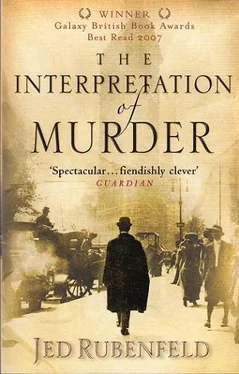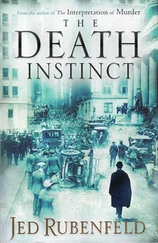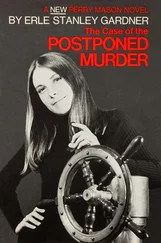Jed Rubenfeld - The Interpretation of Murder
Здесь есть возможность читать онлайн «Jed Rubenfeld - The Interpretation of Murder» весь текст электронной книги совершенно бесплатно (целиком полную версию без сокращений). В некоторых случаях можно слушать аудио, скачать через торрент в формате fb2 и присутствует краткое содержание. Жанр: Исторические приключения, на английском языке. Описание произведения, (предисловие) а так же отзывы посетителей доступны на портале библиотеки ЛибКат.
- Название:The Interpretation of Murder
- Автор:
- Жанр:
- Год:неизвестен
- ISBN:нет данных
- Рейтинг книги:5 / 5. Голосов: 1
-
Избранное:Добавить в избранное
- Отзывы:
-
Ваша оценка:
- 100
- 1
- 2
- 3
- 4
- 5
The Interpretation of Murder: краткое содержание, описание и аннотация
Предлагаем к чтению аннотацию, описание, краткое содержание или предисловие (зависит от того, что написал сам автор книги «The Interpretation of Murder»). Если вы не нашли необходимую информацию о книге — напишите в комментариях, мы постараемся отыскать её.
The Interpretation of Murder — читать онлайн бесплатно полную книгу (весь текст) целиком
Ниже представлен текст книги, разбитый по страницам. Система сохранения места последней прочитанной страницы, позволяет с удобством читать онлайн бесплатно книгу «The Interpretation of Murder», без необходимости каждый раз заново искать на чём Вы остановились. Поставьте закладку, и сможете в любой момент перейти на страницу, на которой закончили чтение.
Интервал:
Закладка:
'You two know each other?' Brill asked.
Littlemore questioned Jelliffe about Harry Thaw for several minutes, to the general astonishment of the others. When the detective was satisfied, he asked Jelliffe why he had sent Brill anonymous threats, burned his manuscript, dumped ash in his apartment, and slandered Dr Freud in the newspaper.
Jelliffe swore his innocence. He professed ignorance of any book-burning or threat-sending.
'Oh, yeah?' said Littlemore. 'Then who put those pages into the manuscript, the ones with the Bible stuff on them?'
'I don't know,' said Jelliffe. 'It must have been those church people.'
'Sure it was,' said Littlemore. He showed Jelliffe the article of evidence we had stopped for on our way — the single sheet of paper from Brill's manuscript that bore not only a verse from Jeremiah but a small stamped image of a turbaned, bearded, scowling man — and went on. 'Then how did this get there? Doesn't look very churchy to me.'
Jelliffe's mouth fell open.
'What is it?' asked Brill. 'You recognize it?'
'The Charaka,' said Jelliffe.
'What?' asked Littlemore.
'Charaka is ancient Hindoo physician,' replied Ferenczi. 'I said Hindoo. You remember I said Hindoo?'
Younger spoke: 'The Triumvirate.'
'No,' said Brill.
'Yes,' Jelliffe acknowledged.
'What?' asked Ferenczi.
Younger addressed Brill: 'We should have seen it all along. Who in New York is not only on the board of Morton Prince's journal, privy to everything Prince is going to publish, but also able to have a man arrested in Boston at the drop of a hat?'
'Dana,' said Brill.
'And the family offering Clark the donation? Hall told us one of them was a doctor knowledgeable about psychoanalysis. There's only one family in the country rich enough to fund an entire hospital that can also boast a world- famous neurologist among its members.'
'Bernard Sachs!' exclaimed Brill. 'And the anonymous doctor in the Times is Starr. I should have recognized the pompous blowhard the minute I read it. Starr is always boasting of having studied in Charcot's laboratory decades ago. He might actually have met Freud there.'
'Who?' asked Ferenczi. 'What is Triumvirate?'
Taking turns, Younger and Brill explained. The men they had just named — Charles Loomis Dana, Bernard Sachs, and M. Allen Starr — were the three most powerful neurologists in the country. Collectively, they were known as the New York Triumvirate. They owed their extraordinary prestige and power to an impressive combination of accomplishment, pedigree, and money. Dana was the author of the nation's leading text on adult nervous diseases. Sachs had a worldwide reputation — particularly because of his work on a disease first described by the Englishman Warren Tay — and wrote the first textbook on children's nervous conditions. Naturally, the Sachses were not the social equals of the very best Danas; they could not participate in society at all, being of the wrong religion. But they were richer. Bernard Sachs's brother had married a Goldman; the private bank founded as a result of this alliance was on its way to becoming a Wall Street bastion. Starr, a professor at Columbia, was the least accomplished of the three.
'He's a windbag,' said Brill, referring to Starr, 'a puppet of Dana's.'
'But why would they seek ruin of Freud?' asked Ferenczi.
'Because they are neurologists,' answered Brill. 'Freud terrifies them.'
'I am not following.'
'They belong to the somatic school,' said Younger. 'They believe that all nervous diseases result from neurological malfunction, not psychological causes. They don't believe in childhood trauma; they don't believe sexual repression causes mental illness. Psychoanalysis is anathema for them. They call it a cult.'
'Over scientific disagreement,' asked Ferenczi, 'they would do these things — burn manuscripts, make threats, spread false accusations?'
'Science has nothing to do with it,' Brill replied. 'The neurologists control everything. They are the "nerve specialists," which makes them the experts in "nervous conditions." All the women go to them for their hysterics, their palpitations, their anxieties, their frustrations. The practice is worth millions to them. They're right to see us as the devil. We're going to put them out of business. No one's going to consult a nerve specialist once they realize that psychological illnesses are caused by psychology, not neurology.'
'Dana was at your party, Jelliffe, 'Younger pursued. 'He was as hostile to Freud as anyone I've ever heard. Did he know of Brill's book?'
'Yes,' answered Jelliffe, 'but he wouldn't have burned it. He approved it. He encouraged me to publish it. He even found me an editor to help prepare the copy.'
'An editor?' asked Younger. 'Did this editor ever take the manuscript out of your offices?'
'Certainly,' Jelliffe replied. 'He often took it home to work on.'
'Well, now we know,' said Brill. 'The bastard.'
'What's this Charaka business?' Littlemore asked.
'It's their club,' Jelliffe replied. 'One of the most exclusive in the city. Hardly anyone is let in. The members wear a signet ring with a face on it. That's the face there — the one on the page.'
'It's a cabal,' said Brill. 'A secret society.'
'But these are scientists,' Ferenczi protested. 'They would burn manuscript and dump ash in Brill's flat?'
'They probably burn incense and sacrifice virgins too,' answered Brill.
'The question is whether they are responsible for the story on Jung in the Times,' said Younger. 'That's what we need to know.'
'Are they?' Littlemore asked Jelliffe.
'Well, I–I may have heard them talking about it once,' said Jelliffe. 'And they did make the arrangements for Jung to speak at Fordham.'
'Of course,' said Brill. 'They are launching Jung to bring Freud down. And Hall is falling for it. What are we going to do? We can't fight Charles Dana.'
'I don't know about that,' Littlemore replied. He addressed Jelliffe again. 'You mentioned a Dana last night, didn't you? Same man?'
Jelliffe nodded.
The servant at the door of the small but elegant house on
Fifty-third Street at Fifth Avenue informed us that Dr Dana was not at home. 'Tell him a detective wants to ask him a few questions about Harry Thaw,' Littlemore replied. 'And mention that I just came from Dr Smith Jelliffe. Maybe he'll be at home after he hears that.'
On the detective's advice, Littlemore and I alone had made the trip to Charles Dana's house; Brill and Ferenczi returned to the hotel. A minute later, the two of us were invited in.
Dana's house had none of the gaudiness of Jelliffe's apartment or of the other houses recently erected on Fifth Avenue — including those of certain relations of mine. Dana's was a red-brick affair. The furniture was handsome without being heavy. As Littlemore and I entered the foyer, we saw Dana emerge from a dark, well-stocked library. He closed the doors behind him and greeted us. He was surprised at my presence, I believe, but reacted with perfect aplomb. He asked after my Aunt Mamie, I after some of his cousins. He made no inquiry into my reason for accompanying Littlemore. One had to be impressed by the man's grace. He looked his age — sixty, I should have thought — but age suited him well. He showed us to another room where, I imagine, he did business and saw patients.
Our conversation with Dana was brief. Littlemore's tone changed. With Jelliffe, he had been hectoring. He made accusations and dared Jelliffe to deny them. With Dana, he was far more careful — still conveying, however, that we knew something Dana would not want us to know.
Dana displayed none of Jelliffe's cringing. He acknowledged that Thaw had retained his services in connection with the trial but noted that his role, unlike Jelliffe s, had been merely advisory. He had rendered no opinion about Thaw's mental state at any time, past or present.
Читать дальшеИнтервал:
Закладка:
Похожие книги на «The Interpretation of Murder»
Представляем Вашему вниманию похожие книги на «The Interpretation of Murder» списком для выбора. Мы отобрали схожую по названию и смыслу литературу в надежде предоставить читателям больше вариантов отыскать новые, интересные, ещё непрочитанные произведения.
Обсуждение, отзывы о книге «The Interpretation of Murder» и просто собственные мнения читателей. Оставьте ваши комментарии, напишите, что Вы думаете о произведении, его смысле или главных героях. Укажите что конкретно понравилось, а что нет, и почему Вы так считаете.












